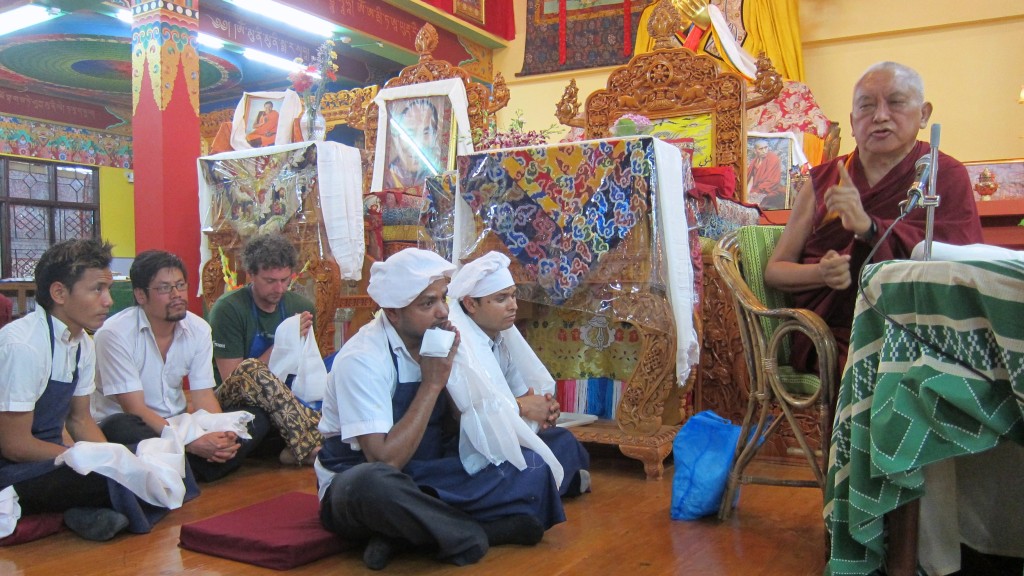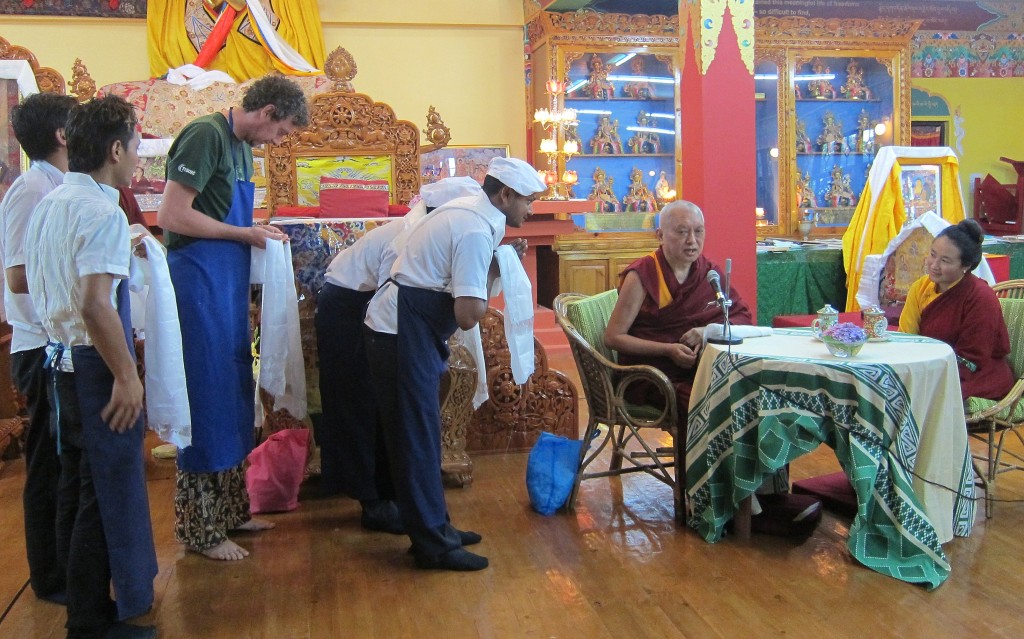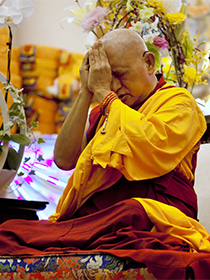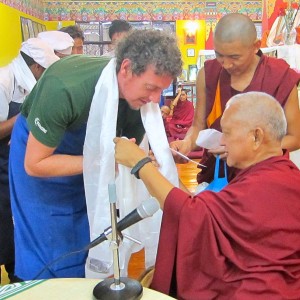- Home
- FPMT Homepage
Foundation for the Preservation of the Mahayana Tradition
The FPMT is an organization devoted to preserving and spreading Mahayana Buddhism worldwide by creating opportunities to listen, reflect, meditate, practice and actualize the unmistaken teachings of the Buddha and based on that experience spreading the Dharma to sentient beings. We provide integrated education through which people’s minds and hearts can be transformed into their highest potential for the benefit of others, inspired by an attitude of universal responsibility and service. We are committed to creating harmonious environments and helping all beings develop their full potential of infinite wisdom and compassion. Our organization is based on the Buddhist tradition of Lama Tsongkhapa of Tibet as taught to us by our founders Lama Thubten Yeshe and Lama Thubten Zopa Rinpoche.
- Willkommen
Die Stiftung zur Erhaltung der Mahayana Tradition (FPMT) ist eine Organisation, die sich weltweit für die Erhaltung und Verbreitung des Mahayana-Buddhismus einsetzt, indem sie Möglichkeiten schafft, den makellosen Lehren des Buddha zuzuhören, über sie zur reflektieren und zu meditieren und auf der Grundlage dieser Erfahrung das Dharma unter den Lebewesen zu verbreiten.
Wir bieten integrierte Schulungswege an, durch denen der Geist und das Herz der Menschen in ihr höchstes Potential verwandelt werden zum Wohl der anderen – inspiriert durch eine Haltung der universellen Verantwortung und dem Wunsch zu dienen. Wir haben uns verpflichtet, harmonische Umgebungen zu schaffen und allen Wesen zu helfen, ihr volles Potenzial unendlicher Weisheit und grenzenlosen Mitgefühls zu verwirklichen.
Unsere Organisation basiert auf der buddhistischen Tradition von Lama Tsongkhapa von Tibet, so wie sie uns von unseren Gründern Lama Thubten Yeshe und Lama Thubten Zopa Rinpoche gelehrt wird.
- Bienvenidos
La Fundación para la preservación de la tradición Mahayana (FPMT) es una organización que se dedica a preservar y difundir el budismo Mahayana en todo el mundo, creando oportunidades para escuchar, reflexionar, meditar, practicar y actualizar las enseñanzas inconfundibles de Buda y en base a esa experiencia difundir el Dharma a los seres.
Proporcionamos una educación integrada a través de la cual las mentes y los corazones de las personas se pueden transformar en su mayor potencial para el beneficio de los demás, inspirados por una actitud de responsabilidad y servicio universales. Estamos comprometidos a crear ambientes armoniosos y ayudar a todos los seres a desarrollar todo su potencial de infinita sabiduría y compasión.
Nuestra organización se basa en la tradición budista de Lama Tsongkhapa del Tíbet como nos lo enseñaron nuestros fundadores Lama Thubten Yeshe y Lama Zopa Rinpoche.
A continuación puede ver una lista de los centros y sus páginas web en su lengua preferida.
- Bienvenue
L’organisation de la FPMT a pour vocation la préservation et la diffusion du bouddhisme du mahayana dans le monde entier. Elle offre l’opportunité d’écouter, de réfléchir, de méditer, de pratiquer et de réaliser les enseignements excellents du Bouddha, pour ensuite transmettre le Dharma à tous les êtres. Nous proposons une formation intégrée grâce à laquelle le cœur et l’esprit de chacun peuvent accomplir leur potentiel le plus élevé pour le bien d’autrui, inspirés par le sens du service et une responsabilité universelle. Nous nous engageons à créer un environnement harmonieux et à aider tous les êtres à épanouir leur potentiel illimité de compassion et de sagesse. Notre organisation s’appuie sur la tradition guéloukpa de Lama Tsongkhapa du Tibet, telle qu’elle a été enseignée par nos fondateurs Lama Thoubtèn Yéshé et Lama Zopa Rinpoché.
Visitez le site de notre Editions Mahayana pour les traductions, conseils et nouvelles du Bureau international en français.
Voici une liste de centres et de leurs sites dans votre langue préférée
- Benvenuto
L’FPMT è un organizzazione il cui scopo è preservare e diffondere il Buddhismo Mahayana nel mondo, creando occasioni di ascolto, riflessione, meditazione e pratica dei perfetti insegnamenti del Buddha, al fine di attualizzare e diffondere il Dharma fra tutti gli esseri senzienti.
Offriamo un’educazione integrata, che può trasformare la mente e i cuori delle persone nel loro massimo potenziale, per il beneficio di tutti gli esseri, ispirati da un’attitudine di responsabilità universale e di servizio.
Il nostro obiettivo è quello di creare contesti armoniosi e aiutare tutti gli esseri a sviluppare in modo completo le proprie potenzialità di infinita saggezza e compassione.
La nostra organizzazione si basa sulla tradizione buddhista di Lama Tsongkhapa del Tibet, così come ci è stata insegnata dai nostri fondatori Lama Thubten Yeshe e Lama Zopa Rinpoche.
Di seguito potete trovare un elenco dei centri e dei loro siti nella lingua da voi prescelta.
- 欢迎 / 歡迎
简体中文
“护持大乘法脉基金会”( 英文简称:FPMT。全名:Foundation for the Preservation of the Mahayana Tradition) 是一个致力于护持和弘扬大乘佛法的国际佛教组织。我们提供听闻,思维,禅修,修行和实证佛陀无误教法的机会,以便让一切众生都能够享受佛法的指引和滋润。
我们全力创造和谐融洽的环境, 为人们提供解行并重的完整佛法教育,以便启发内在的环宇悲心及责任心,并开发内心所蕴藏的巨大潜能 — 无限的智慧与悲心 — 以便利益和服务一切有情。
FPMT的创办人是图腾耶喜喇嘛和喇嘛梭巴仁波切。我们所修习的是由两位上师所教导的,西藏喀巴大师的佛法传承。
繁體中文
護持大乘法脈基金會”( 英文簡稱:FPMT。全名:Found
ation for the Preservation of the Mahayana Tradition ) 是一個致力於護持和弘揚大乘佛法的國際佛教組織。我們提供聽聞, 思維,禪修,修行和實證佛陀無誤教法的機會,以便讓一切眾生都能 夠享受佛法的指引和滋潤。 我們全力創造和諧融洽的環境,
為人們提供解行並重的完整佛法教育,以便啟發內在的環宇悲心及責 任心,並開發內心所蘊藏的巨大潛能 — 無限的智慧與悲心 – – 以便利益和服務一切有情。 FPMT的創辦人是圖騰耶喜喇嘛和喇嘛梭巴仁波切。
我們所修習的是由兩位上師所教導的,西藏喀巴大師的佛法傳承。 察看道场信息:
- FPMT Homepage
- News/Media
-
- Study & Practice
-
-
- About FPMT Education Services
- Latest News
- Programs
- New to Buddhism?
- Buddhist Mind Science: Activating Your Potential
- Heart Advice for Death and Dying
- Discovering Buddhism
- Living in the Path
- Exploring Buddhism
- FPMT Basic Program
- FPMT Masters Program
- FPMT In-Depth Meditation Training
- Maitripa College
- Lotsawa Rinchen Zangpo Translator Program
- Universal Education for Compassion & Wisdom
- Online Learning Center
-
- Prayers & Practice Materials
- Overview of Prayers & Practices
- Full Catalogue of Prayers & Practice Materials
- Explore Popular Topics
- Benefiting Animals
- Chenrezig Resources
- Death & Dying Resources
- Lama Chopa (Guru Puja)
- Lama Zopa Rinpoche: Compendium of Precious Instructions
- Lama Zopa Rinpoche: Life Practice Advice
- Lama Zopa Rinpoche Practice Series
- Lamrim Resources
- Mantras
- Prayer Book Updates
- Purification Practices
- Sutras
- Thought Transformation (Lojong)
- Audio Materials
- Dharma Dates - Tibetan Calendar
- Translation Services
- Publishing Services
- Ways to Offer Support
- Prayers & Practice Materials
-
- Teachings and Advice
- Find Teachings and Advice
- Lama Zopa Rinpoche Advice Page
- Lama Zopa Rinpoche: Compendium of Precious Instructions
- Lama Zopa Rinpoche Video Teachings
- ༧སྐྱབས་རྗེ་བཟོད་པ་རིན་པོ་ཆེ་མཆོག་ནས་སྩལ་བའི་བཀའ་སློབ་བརྙན་འཕྲིན།
- Podcasts
- Lama Yeshe Wisdom Archive
- Buddhism FAQ
- Dharma for Young People
- Resources on Holy Objects
- Teachings and Advice
-
-
*If a menu item has a submenu clicking once will expand the menu clicking twice will open the page.
-
-
- Centers
-
- Teachers
-
- Projects
-
-
-
-
*If a menu item has a submenu clicking once will expand the menu clicking twice will open the page.
-
-
- FPMT
-
- Shop
-
-
-
The Foundation Store is FPMT’s online shop and features a vast selection of Buddhist study and practice materials written or recommended by our lineage gurus. These items include homestudy programs, prayers and practices in PDF or eBook format, materials for children, and other resources to support practitioners.
Items displayed in the shop are made available for Dharma practice and educational purposes, and never for the purpose of profiting from their sale. Please read FPMT Foundation Store Policy Regarding Dharma Items for more information.
-
-
2

Lama Zopa Rinpoche giving advice to the cooks of Tushita Meditation Centre, Dharamsala, India, June 2013. Photo by Ven. Sarah Thresher.
During Lama Zopa Rinpoche’s most recent visit to Tushita Meditation Centre in Dharamsala, India, Rinpoche gave the following advice to the Tushita cooks:
I have been hearing from people that the food at Tushita is fantastic. Generally, they tell me they are very happy with the place and especially the food. I was amazed to hear this and particularly that you have been able to improve the flavor and quality of the food without using onions, garlic or other black foods. Of course, the initial reason why people come to Tushita is not the food, but for the teachings and meditations; they are a little bored with the lives they have and are looking for something new. However, the conditions at Tushita –and especially the food – are a very important support for the teachings and meditations. Sometimes in the past, for example, when I would teach on impermanence, the hells and the eight worldly dharmas, people would get scared and leave, but if the food was good, they would stay. That’s one way to keep them!
So I’ve been thinking for many days to come to the kitchen and explain a short meditation to the cooks. There is a short morning motivation I have put together with a direct meditation on the graduated path to the peerless happiness of full enlightenment. (Most of the time in English we use the expression “fully enlightened” but in Tibetan it is sang gye; sang means that all the obscurations, gross and subtle have been purified, and gye that all the realizations have been fully developed and there is nothing more to achieve. “Fully enlightened” has a different meaning; it’s better to say “fully omniscient mind.”) [This meditation is] followed by some verses explaining how precious and kind sentient beings are.
Every single sentient being is most precious, dear and wishfulfilling – fulfilling all your wishes for the happiness of future lives, liberation and enlightenment. Every hell being, hungry ghost, animal, insect, ant, mosquito, bird, goat, human being, sura and asura does this. That is because all our beginningless past lives’ happiness, present happiness and future happiness comes from good karma and that good karma comes from your mind, from mental intention. Buddha’s enlightened activity is of two types: one comes from Buddha’s holy mind and one from your mind. Buddhas come from bodhisattvas, bodhisattvas come from bodhichitta and bodhichitta comes from great compassion. Great compassion comes from every single obscured suffering sentient being. There is no way to generate great compassion without depending on every single suffering sentient being. Therefore, there is no bodhichitta, no bodhisattva, no Buddha and no way to create good karma, the cause of happiness, without them. In other words, every single happiness and comfort comes from sentient beings, even a cool breeze or a drink of water when you are thirsty. Without sentient beings there is no way to experience happiness in this life, future lives, liberation or enlightenment. All our happiness comes from every single sentient being.
For example, all my happiness comes from every one of you and from all the rest of the sentient beings; every hell being, hungry ghost, animal, human, sura and asura. All my past, present and future happiness comes from everyone because Buddha, Dharma and Sangha in whom I take refuge and with whom I purify every single negative karma and achieve the peerless happiness of full enlightenment come from everyone. That is why sentient beings are most kind, dear, precious and wishfulfilling.
Sentient beings are more precious than a wishfulfilling jewel because you can’t practice morality, purify negative karma and achieve a higher rebirth with a wishfulfilling jewel. Nor can you practice the three higher trainings and achieve the ultimate happiness of liberation or generate great compassion and achieve enlightenment with a wishgranting jewel, but you can with sentient beings. If you pray to a wishgranting jewel you can get a house, car, swimming pool and so on, but not higher rebirths, liberation and enlightenment. That’s why sentient beings are most unbelievably precious. Which one is more precious – skies of wishgranting jewels or sentient beings? Sentient beings are more precious!
Therefore, dedicating your life to others and helping them is the best, most exciting thing you can do. Serving them in any way you can and giving them whatever help you can give is what brings the most happiness. For example, helping an old man carrying a very heavy load or giving your seat to somebody in a bus, train or car. Doing whatever it is that sentient beings need, whether big or small, is the most satisfying, exciting thing you can do.
That’s why making delicious food and offering it to the people who come here is a really great opportunity. Wow, wow, wow, wow. It is a way of offering comfort and happiness to sentient beings who are most wishfulfilling. That’s what brings the most happiness and excitement. It’s the real Dharma. Dharma is something that protects your life, protects you from suffering and guides you to happiness….
There is a great deal to rejoice in that you have this very precious opportunity to offer food to sentient beings who are most precious, dear, kind and wishfulfilling.

Lama Zopa Rinpoche and Khadro-la with Tushita Meditation Centre cooks, June 2013. Photo by Ven. Sarah Thresher.
Practicing bodhichitta mindfulness in the kitchen
Here are some ways to think while you are preparing and cooking the food:
When you are cutting anything, for example onions, think,
I am cutting the root of all sentient beings’ suffering which comes from ignorance and the self-cherishing thought, with the knife of the wisdom realizing emptiness (shunyata) and bodhichitta.
When you are washing pots and so on think,
I am washing away all the obscurations and negative karmas from all sentient beings’ minds.
You can think that you are washing away your own obscurations and negative karmas but most important is to think you are washing away those of all sentient beings. And you can think the water is nectar coming from Vajrasattva, the Guru, His Holiness the Dalai Lama, or Guru Shakyamuni Buddha. There is always a lot of washing up to do in the kitchen and you can use the opportunity to purify all sentient beings’ obscurations. It’s very good if you can sincerely think this way because all the washing up becomes Dharma practice purifying your negative karma and defilements and collecting merits. In India even the beggars keep their pots very clean!
When you are sweeping the floor think that the broom is the whole path to enlightenment, especially wisdom and bodhichitta, and that the dust is all sentient beings’ obscurations.
I am sweeping away the dust of all sentient beings’ obscurations with the broom of the path to enlightenment and especially wisdom and bodhichitta.
If you sincerely think this while you are cleaning it becomes real Dharma practice that benefits all sentient beings. In the lam-rim it says to think that you are abandoning the dust of the three poisonous minds – anger, attachment and ignorance – which are the gross obscurations and also the stains of the three poisonous minds, the subtle obscurations.
When you are kneading dough so that it can be made into any shape think,
I am taming all sentient beings’ minds by softening them with my two hands of the wisdom realizing emptiness and bodhichitta.
When you are making momos or shapale – rolling out pastry and filling it with cheese, potato and vegetables – think,
I am filling all sentient beings’ minds with the realizations of the path from guru devotion up to enlightenment so that they can actualize all the qualities of a buddha.
When you are cooking soup or other food you can think that the fire is the Six Yogas’ tummo fire that causes the kundalini to melt. Do the same meditation that is used to bless the inner offering in highest yoga tantra. Or you can think that the fire is the wisdom realizing emptiness and the uncooked food is the unsubdued mind. By cooking the food all the gross and even the subtle delusions are purified and all the realizations of Buddha are achieved.
These are some ways of thinking as you are working in the kitchen. You can think in a similar way with other kitchen activities.
Typed and edited by Ven. Sarah Thresher at Tushita Meditation Centre, Dharamsala, India, June 17, 2013.
Mandala brings you news of FPMT activities, teachers and events from over 160 FPMT centers, projects and services around the globe. If you have news you would like to share, please let us know.
- Home
- News/Media
- Study & Practice
- About FPMT Education Services
- Latest News
- Programs
- New to Buddhism?
- Buddhist Mind Science: Activating Your Potential
- Heart Advice for Death and Dying
- Discovering Buddhism
- Living in the Path
- Exploring Buddhism
- FPMT Basic Program
- FPMT Masters Program
- FPMT In-Depth Meditation Training
- Maitripa College
- Lotsawa Rinchen Zangpo Translator Program
- Universal Education for Compassion & Wisdom
- Online Learning Center
- Prayers & Practice Materials
- Overview of Prayers & Practices
- Full Catalogue of Prayers & Practice Materials
- Explore Popular Topics
- Benefiting Animals
- Chenrezig Resources
- Death & Dying Resources
- Lama Chopa (Guru Puja)
- Lama Zopa Rinpoche: Compendium of Precious Instructions
- Lama Zopa Rinpoche: Life Practice Advice
- Lama Zopa Rinpoche Practice Series
- Lamrim Resources
- Mantras
- Prayer Book Updates
- Purification Practices
- Sutras
- Thought Transformation (Lojong)
- Audio Materials
- Dharma Dates – Tibetan Calendar
- Translation Services
- Publishing Services
- Teachings and Advice
- Find Teachings and Advice
- Lama Zopa Rinpoche Advice Page
- Lama Zopa Rinpoche: Compendium of Precious Instructions
- Lama Zopa Rinpoche Video Teachings
- ༧སྐྱབས་རྗེ་བཟོད་པ་རིན་པོ་ཆེ་མཆོག་ནས་སྩལ་བའི་བཀའ་སློབ་བརྙན་འཕྲིན།
- Podcasts
- Lama Yeshe Wisdom Archive
- Buddhism FAQ
- Dharma for Young People
- Resources on Holy Objects
- Ways to Offer Support
- Centers
- Affiliates Area
- Teachers
- Projects
- Charitable Projects
- Make a Donation
- Applying for Grants
- News about Projects
- Other Projects within FPMT
- Support International Office
- Projects Photo Galleries
- Give Where Most Needed
- FPMT
- Shop
Subscribe to FPMT News
Translate*
*powered by Google TranslateTranslation of pages on fpmt.org is performed by Google Translate, a third party service which FPMT has no control over. The service provides automated computer translations that are only an approximation of the websites' original content. The translations should not be considered exact and only used as a rough guide.We can transform any problem, even death, into happiness. The point is not to stop the experience of problems but to stop the conditions that we call ‘problems’ from disturbing our mind, and instead use them to support the spiritual path that we practice.









